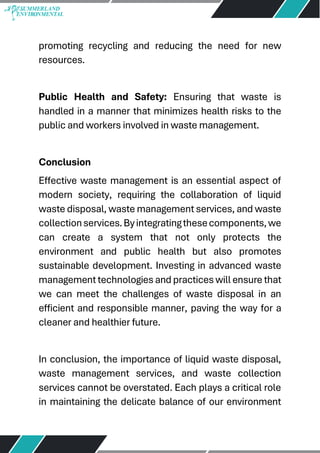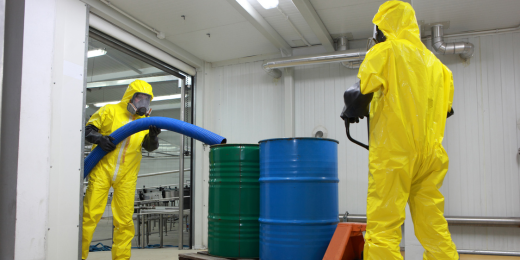Reclaim Waste - Questions
Reclaim Waste - Questions
Blog Article
Reclaim Waste - An Overview
Table of ContentsNot known Details About Reclaim Waste Some Known Details About Reclaim Waste Some Known Details About Reclaim Waste Some Known Factual Statements About Reclaim Waste Some Of Reclaim Waste
Check out the types, events, and types of liquid waste. Residential sewage waste describes the waste and items from a property septic storage tank. This type of waste is developed by people in houses, colleges, and other structures. This only consists of sewage-disposal tanks that have a drainpipe field. The correct administration and disposal of domestic sewer waste need liquid waste to be moved to a sewer treatment plant where the correct approaches and devices are related to cleanse and take care of waste.
Commercial waste commonly includes prospective dangers, such as flammable materials or a mixture of fluid and strong waste items, and requires an advanced and in-depth disposal procedure. The disposal of commercial waste normally involves the filtering of waste prior to transport to ensure risk-free and correct disposal. Hazardous waste is developed from byproducts and overflow of commercial procedures and manufacturing.
This kind of waste can not use the exact same sewer monitoring transportation or processes as septic or industrial liquids. The industrial waste administration procedure calls for the inspection and testing of fluid waste before it goes through the disposal procedure (industrial wastewater treatment). Runoff waste is the liquid waste that comes from runoff and excess stormwater in very inhabited areas or cities
Overflow waste can create contamination and flooding otherwise dealt with appropriately. Discover a lot more regarding sewer cleansing and waste monitoring. Ensuring correct waste monitoring can protect against calamities and reduce ecological damage. Both individuals in property settings and professionals in commercial or manufacturing sectors can gain from comprehending the processes and policies of liquid waste monitoring.
See This Report about Reclaim Waste
Contact PROS Solutions today to discover our waste administration and disposal solutions and the correct ways to look after the liquid waste you generate.
(https://www.provenexpert.com/reclaim-waste/)Do you recognize what takes place to your water when you end, purge the commode or drain pipes the cleaning maker? No? Well, it's worth knowing. This supposed 'wastewater' is not only a vital source however, after treatment, will be released to our land, waterways or the sea. Utilized water from toilets, showers, bathrooms, kitchen sinks, washings and industrial procedures is called wastewater.

water made use of to cool machinery or tidy plant and equipment). Stormwater, a kind of wastewater, is overflow that moves from agricultural and urban areas such as roof coverings, parks, gardens, roadways, paths and rain gutters into stormwater drains, after rainfall. Stormwater flows untreated straight to neighborhood creeks or rivers, ultimately reaching the ocean.
Reclaim Waste Things To Know Before You Get This
In Queensland, most wastewater is dealt with at sewer treatment plants. Wastewater is moved from residential or industrial sites via a system of sewers and pump stations, called sewerage reticulation, to a sewage treatment plant. City governments construct, keep and operate most sewer therapy plants. Operators are certified under the Environmental Management Act 1994 to discharge treated wastewater at an appropriate ecological criterion right into waterways.
The Department of Natural Resources advises regional governments about handling, operating and maintaining sewerage systems and therapy plants. In unsewered areas, regional federal governments might need homeowners to install private or house sewage therapy systems to treat residential wastewater from toilets, kitchen areas, bathrooms and washings. The Department of Natural Resources authorises the usage of home systems when they are proven to be efficient.
In some brand-new subdivisions, treatment of some stormwater to get rid of clutter, sand and crushed rock has started making use of gross toxin traps. Wastewater therapy happens in four stages: Gets rid of strong matter.
Makes use of tiny living microorganisms recognizes as micro-organisms to break down and eliminate continuing to be liquified wastes and great fragments. Micro-organisms and wastes are included in the sludge.
What Does Reclaim Waste Do?
Nutrient removal is not available in all sewage therapy plants since it requires costly specialized equipment. It is becoming much more usual in Queensland. Clear fluid effluent produced after therapy may still contain disease-causing micro-organisms. If this effluent is released into rivers such as rivers or the sea, the micro-organisms will eventually pass away out.

Most wastewater streams into the sewage system. Under the Act, neighborhood federal governments provide approvals and licences for environmentally appropriate activities (Ages) entailing wastewater releases that may have a regional influence.
Getting My Reclaim Waste To Work
Surveillance supplies factual details concerning water high quality and can confirm that permit conditions are being satisfied. The information acquired via surveillance offers the basis for making water quality decisions.
Report this page